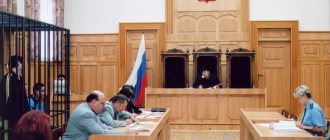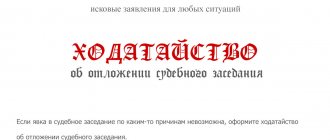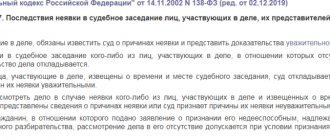1. A court hearing at the request of the defendant to pronounce a sentence without a trial in connection with agreement with the charge brought is held in the manner established by Chapters 35, 36, 38 and 39 of this Code, taking into account the requirements of this article.
2. The court hearing is held with the mandatory participation of the defendant and his defense attorney.
3. Consideration of the defendant’s request for a verdict without a trial begins with the presentation of the charge brought against the defendant by the state prosecutor, and in criminal cases of private prosecution - with the presentation of the charge by the private prosecutor.
4. The judge asks the defendant whether he understands the charges, whether he agrees with the charges and whether he supports his petition for a verdict without a trial, whether this petition was submitted voluntarily and after consultation with a defense lawyer, whether he understands the consequences of a verdict without a trial . When the victim participates in the court hearing, the judge explains to him the procedure and consequences of passing a sentence without a trial and ascertains his attitude to the defendant’s petition.
5. The judge does not conduct a general examination and assessment of evidence collected in a criminal case. In this case, circumstances characterizing the personality of the defendant, and circumstances mitigating and aggravating the punishment can be examined.
6. If the defendant, public or private prosecutor, or victim objects to the sentencing without a trial or on his own initiative, the judge makes a decision to terminate the special procedure of the trial and order the consideration of the criminal case in the general procedure.
7. If the judge comes to the conclusion that the accusation agreed with by the defendant is justified and supported by evidence collected in the criminal case, then he will pronounce a guilty verdict and assign the defendant a punishment that cannot exceed two-thirds of the maximum term or amount of the most severe type of punishment provided for the crime committed.
8. The descriptive and motivational part of the guilty verdict must contain a description of the criminal act, the charge of which the defendant agreed to, as well as the court’s conclusions about compliance with the conditions of the verdict without a trial. The judge's analysis of the evidence and its assessment are not reflected in the verdict.
9. After pronouncing the verdict, the judge explains to the parties the right and procedure for appealing it, provided for in Chapter 45.1 of this Code.
10. Procedural costs provided for in Article 131 of this Code are not subject to recovery from the defendant.
Another comment on Art. 316 Criminal Procedure Code of the Russian Federation
1. A court hearing at the defendant’s request to apply a special trial procedure begins with the court examining the grounds for satisfying the stated request (see Article 314 and the commentary thereto). Since the participation of the victim in the court hearing is not mandatory, his attitude towards the stated petition can be established on the basis of a written statement.
2. The special procedure for trial is terminated if obstacles to its conduct are identified at the court hearing (violation of the procedure for filing a motion, objections from the prosecution). In addition, the judge is obliged, on his own initiative, to issue a resolution to terminate the special procedure of the trial and order the consideration of the criminal case in the general procedure if, before the verdict is passed, circumstances are established that impede a conviction, or grounds for changing the classification of the offense or terminating the criminal case or acquittal of the defendant.
3. The punishment imposed by the court on the defendant in the case of applying a special procedure for trial should not exceed two-thirds of the maximum term or amount of the most severe type of punishment provided for the crime committed. The restrictions established by the commented article do not apply to cases where the defendant is assigned a less severe punishment or an additional punishment from those provided for in the relevant article of the Criminal Code, which can be applied by the court without additional restrictions. When passing a sentence, the court must take into account mitigating and aggravating circumstances, along with the general rule on imposing punishment in a special procedure of the trial.
The procedure for conducting a preliminary hearing in criminal proceedings
Based on Art. 234 of the Code of Criminal Procedure of the Russian Federation, a preliminary hearing in a criminal case takes place in the following mode.
The parties call by notice, which must be sent in advance - at least three days before the date of the preliminary hearing. The accused may be absent if a corresponding petition is sent on his behalf or on behalf of one of the parties. If other participants notified on time do not appear at the hearing, it will not be postponed and will take place without them.
In case of an exclusive evidentiary request of the party, which is submitted within the framework of Art. 235 of the Code of Criminal Procedure of the Russian Federation, the judge determines whether there are any objections. If there are none, such a request is granted. Then a court hearing is scheduled.
A request for additional evidence or items submitted by the defense will be granted if these additions are valuable to the case.
Those who know anything about the investigative actions carried out, the seizure and inclusion of documents in the criminal record, can (at the request of the parties) be questioned as witnesses. Only holders of witness immunity are not interrogated in this regime (clause 40 of Article 5 of the Code).
Minutes are taken during the hearing.
How are preliminary hearings conducted?
If the preparation of a criminal case for trial involves preliminary hearings, they are conducted by a judge and only if there are reasons for this from Part 2 of Art. 229 of the Code of Criminal Procedure of the Russian Federation (based on personal judicial initiative or petitions of the parties).
The parties may request a preliminary hearing after familiarizing themselves with the case materials. The accused will have three days to take similar actions after receiving copies of the indictment documents.
The reason for holding a preliminary hearing may be the presence of:
- petitions of the parties (implemented on the basis of Article 239.2 of the Code of Criminal Procedure of the Russian Federation);
- grounds for separating a criminal case (implemented on the basis of Article 239.1 of the Code of Criminal Procedure);
- a sentence that has not entered into force and conditionally condemns a person for a previously committed crime;
- request for a trial by jury;
- petitions of the parties to conduct proceedings under Part 5 of Art. 247 Code of Criminal Procedure;
- suspension, termination of the case on appropriate grounds;
- grounds for returning a criminal case to the prosecutor (they are stipulated in Article 237 of the Code of Criminal Procedure);
- petitions of the party to exclude evidence (this is stated under Part 3 of Article 229 of the Code of Criminal Procedure of the Russian Federation).
Commentary on Article 316 of the Code of Criminal Procedure of the Russian Federation
1. When assigning a punishment to a convicted person in a case considered in a special order, it is necessary to apply a set of rules: firstly, on the imposition of a punishment not related to imprisonment for a crime of minor gravity, i.e. on fulfilling the requirement of Part 1 of Art. 56 of the Criminal Code on the impossibility of imposing imprisonment; secondly, about taking into account the rule of Part 5 of Art. 62 of the Criminal Code, i.e. on the calculation of two thirds (and in the case specified in Article 226.9 of the Code of Criminal Procedure - one second) not of the term of imprisonment, but of the term (size) of the next most severe punishment from among those specified in the sanction of the article of the Criminal Code. In Part 5 of Art. 62 of the Criminal Code limits the upper limit of the term of the most severe punishment for a crime committed (and not the upper limit of the most severe punishment specified in the sanction of the article of the Criminal Code), which is explained in paragraph 13 of the Resolution of the Plenum of the Supreme Court of the Russian Federation of December 5, 2006 N 60 “On the application by courts special procedure for the trial of criminal cases" (as amended by the Resolution of the Plenum of June 5, 2012). When imposing punishment in such cases, additional reference to Part 7 of the commented article is not required <1614>. ——————————— <1614> See: Answers to questions received from the courts on the application of Federal Laws of March 7, 2011 N 26-FZ “On Amendments to the Criminal Code of the Russian Federation” and from December 7, 2011 N 420-FZ “On amendments to the Criminal Code of the Russian Federation and certain legislative acts of the Russian Federation”, approved by the Presidium of the Supreme Court of the Russian Federation on June 27, 2012 // Bulletin of the Supreme Court of the Russian Federation. 2012. N 11.
2. Specified in Part 5 of Art. 62 of the Criminal Code and in part 7 of the commented article the requirement to assign to the defendant, when considering a case in a special procedure, a punishment of no more than two-thirds (and in the case specified in Article 226.9 of the Code of Criminal Procedure - one second) of the maximum term or amount of the most severe type of punishment provided for for the crime committed, do not apply to additional punishments <1615>. ——————————— <1615> See: Resolution of the Plenum of the Supreme Court of the Russian Federation of December 5, 2006 N 60 “On the application by courts of a special procedure for the trial of criminal cases” // Bulletin of the Supreme Court of the Russian Federation. 2007. N 2.
3. See also the contents and commentary to Art. Art. 42, 131, 234 - 272, 281, 292 - 314, 317.7, 389.1 - 389.19 Code of Criminal Procedure of Russia.
When a preliminary hearing is not required
The preparation of a criminal case for a court hearing is carried out without sending the case to jurisdiction or a preliminary hearing when there is no reason for this. The judge appoints a court hearing, the date, time and place of which the parties are informed 5 days in advance.
For the defendant, the appointment of a hearing means the loss of the right to request a trial by either a jury or a panel of three judges, or a preliminary hearing.
Persons named in the court order are summoned to court by order of the judge. The case begins:
- no earlier than a week after the defendant is served with copies of the indictment documents;
- no later than two weeks after the judge makes a decision to schedule a court hearing.
In cases that the court considers with the participation of jurors, this period is 30 days.







